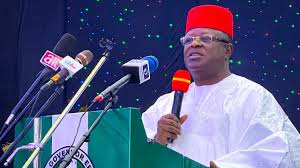The Minister of Works, David Umahi, says the Federal Government needs more than N16 trillion to complete inherited road projects nationwide.
Umahi made the disclosure when he briefed newsmen on the achievements of the ministry under the Renewed Hope Agenda of President Bola Tinubu on Thursday in Abuja.
He said that the present administration inherited a total of 18,932.50 kilometres of ongoing road projects, with a total of 2,064 contracts.
The minister said that the total value of all the ongoing projects as of May 2023 was N14.42 trillion.
He said that the amount certified was N4.73 trillion with N3.12 trillion paid and N1.61 trillion owed.
“The funding gap to complete all the inherited projects is about N13 trillion as of May 2023; that will be more than N16 trillion when all projects are reviewed in line with current market realities.
“This is due to the removal of fuel subsidies and the floating of the naira.
“It is a very sound economic decision by this administration, considering the fact that some of the projects have lingered for between five and eight years.
“Consequently, the projects are being reviewed to match current market realities; this position excludes all the new projects under the Renewed Hope Agenda and the four legacy projects,’’ Umahi said.
According to him, the old traditional method of funding highway projects was through the annual budgetary provision.
He said, however, that over the years, budget provisions had seemed inadequate to address the challenges of highway development.
Umahi stated that to meet up funding for road projects, the ministry embraced alternative funding mechanisms like the Presidential Infrastructure Development Fund (PIDF) and Sovereign SUKUK issued by the Debt Management Office (DMO).
The minister said that other funding included the Road Tax Credit Scheme (NNPCL, NLNG, Dangote, BUA, MIN, Mainstream Energy Solutions Ltd., and GZI Industries) and the use of multilateral loans.
Others are the Public Private Partnership (PPP)/Highway Development Management Initiative (HDMI) and the newly established Renewed Hope Infrastructure Funding model.
He said that 82 projects were approved under the SUKUK fund, with a total sum of N100 billion invested in road construction and rehabilitation in 2017.
Umahi added that the projects included N100 billion in 2018, N162.55 billion in 2020, and N210.56 billion in 2021; for 2,812 km of road, N110 billion was approved in 2022, and the approved 2023 SUKUK provision stood at N250 billion.
He said that the sum of N2.59 trillion was approved by the Federal Executive Council (FEC) for the funding of 65 highway projects under Phases I and II of the NNPCL Funding.
The minister said that the projects were to cover a total of 6,358 km, while the available funding for the projects up to 2025 was N2.59 trillion.
“The reviewed total contract sum due to inflation is N5.288 trillion.
“The funding gap for the completion of both phases I and II is N2.702 trillion.
“To date, the total payment made by NNPCL is in the sum of N840 billion, and the total outstanding funding approved by FEC is N1.750 trillion.
The projects are spread across the six geopolitical zones of the country,’’ he said.
The minister said that the ministry, under its statutory responsibilities over the federal road network, introduced the Highway Development and Management Initiative (HDMI) under the Public Private Partnership Unit (PPP).
He said that this was to attract sustainable investment and funding in the development of road infrastructure and maximise the use of assets along the Right of Way (ROW).
Umahi said that the idea behind the private sector engagement was to provide an alternative source of financing for road development and management.
He said that the HDMI was expected to, among other things, bring order, accountability, and profitable entrepreneurship to the operations, management, and maintenance of federal highways.
The minister said that the emergent concessionaires would recoup their investments through toll and non-toll revenues, as may be negotiated.
He added that four legacy highway projects were selected under the Renewed Hope Agenda of the current administration for implementation to improve road network and train service connectivity across the six geopolitical zones and boost socio-economic development.
Umahi listed the projects to include the Lagos-Calabar (750 km) Coastal Road Corridor, Sokoto-Badagry (1,068 km) Road, Calabar-Abuja Superhighway Project (482 km) (TransSaharan Road), and Akwanga-Jos-Bauchi-Gombe Road (439 km).
He said that the Renewed Hope mandate of the Federal Ministry of Works included the planning, design, construction, and maintenance of federal road infrastructure nationwide.

